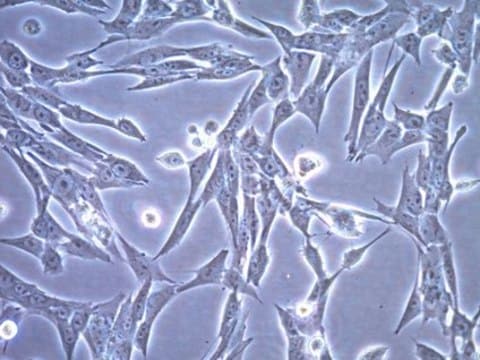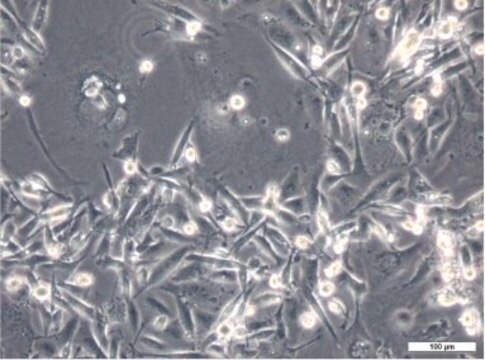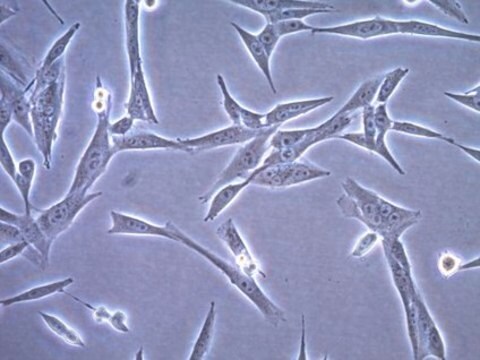08061901
U-373 MG (Uppsala) cell line
NOTE: Both the cell line and DNA from the cell line may be available for this product. Please choose -1VL or VIAL for cells, or -DNA-5UG for DNA.
Sinónimos:
U-373MG Cells, U373-MG Cells, U373MG Cells
About This Item
Productos recomendados
origen biológico
human brain
Formulario
liquid
envase
tube of 5 μg 08061901-DNA-5UG
pkg of vial of cells 08061901-1VL
modo de crecimiento
Adherent
cariotipo
2n = 46
morfología
Pleomorphic/astrocytoid
receptores
PDGFR alpha and EGFR. See Nistér M. et al., (1988) & (1991)
técnicas
cell culture | mammalian: suitable
enfermedades relevantes
cancer
Origen línea celular
Descripción línea celular
Background to the identity query for the cell line U-373 MG: The American Type Culture Collection (ATCC) reported that their stock of U-373 MG had been shown to have differing genetic properties to stock from the originator′s laboratory, and to share similarities with another glioblastoma cell line, U-251. In light of this, ECACC undertook an investigation into the authenticity of its own stock of the U-373 MG cell line. ECACC found similar results to the ATCC i.e. the stock held as U-373 MG was found to be identical by STR-PCR profiling to U-251. The U-373 MG cell line listed under catalogue number 89081403 has been re-named as ′U-251 (formerly known as U-373 MG)′.
Aplicación
Acciones bioquímicas o fisiológicas
Envase
Perfil del ADN
CSF1PO: 11,12
D13S317: 8
D16S539: 12,13
D5S818: 12
D7S820: 8.2,12
THO1: 7,9.3
TPOX: 8
vWA: 17,18
Medio de cultivo
Rutina de subcultivo
Otras notas
Cultures from HPA Culture Collections and supplied by Sigma are for research purposes only. Enquiries regarding the commercial use of a cell line are referred to the depositor of the cell line. Some cell lines have additional special release conditions such as the requirement for a material transfer agreement to be completed by the potential recipient prior to the supply of the cell line. Please view the Terms & Conditions of Supply for more information.
Cláusula de descargo de responsabilidad
Código de clase de almacenamiento
10 - Combustible liquids
Clase de riesgo para el agua (WGK)
WGK 3
Punto de inflamabilidad (°F)
Not applicable
Punto de inflamabilidad (°C)
Not applicable
Elija entre una de las versiones más recientes:
Certificados de análisis (COA)
It looks like we've run into a problem, but you can still download Certificates of Analysis from our Documentos section.
Si necesita más asistencia, póngase en contacto con Atención al cliente
¿Ya tiene este producto?
Encuentre la documentación para los productos que ha comprado recientemente en la Biblioteca de documentos.
Nuestro equipo de científicos tiene experiencia en todas las áreas de investigación: Ciencias de la vida, Ciencia de los materiales, Síntesis química, Cromatografía, Analítica y muchas otras.
Póngase en contacto con el Servicio técnico






